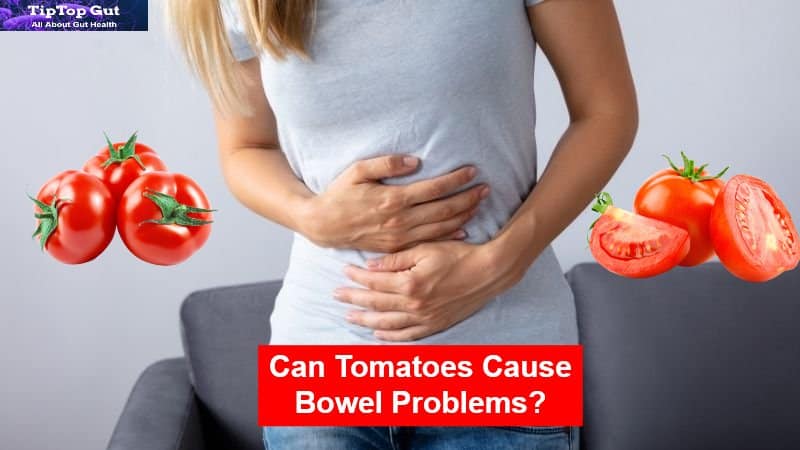Most people eat tomatoes every day. They are used in many dishes to add a unique flavor. The health benefits of lycopene found in tomatoes have been proven. Are you aware of the potential side effects of tomatoes?
They may not be appropriate for everyone and are not recommended for everyone.
Tomatoes, a member of the nightshade family “Solanaceae,” are a vital ingredient in many delicious dishes we love to savor. Although technically a fruit, this juicy and squishy berry is essential to the culinary world. Every dish needs ripe, mushy tomatoes. This tangy red ingredient can cause problems in your body if you overindulge. This acidic, juicy vegetable can lead to many health problems.
Consuming larger amounts of tomato leaves, as well as vegetables, can cause severe health problems. You may find these side effects alarming if you love tomatoes and want to cut them from your recipe list.
Here, we’re going to answer a common question,”Can tomatoes cause bowel problems?”
Let’s move towards the answer.
Can Tomatoes Cause Bowel Problems?
Tomatoes are healthy, have many vitamins and minerals, and are good sources of antioxidants (lycopene) and other phytochemicals. Some people may experience IBS symptoms when they eat tomatoes.
Tomatoes Trigger IBS
Irritable bowel syndrome, also known as IBS, is a common disorder that millions worldwide experience daily.
IBS can impact your quality of life. Most people don’t understand how to deal with this disorder.
IBS symptoms include constipation, diarrhea and bloating. Many people feel worse after eating but cannot identify the culprit.
Many people have said that tomatoes make them feel worse, especially with bloating and diarrhea.
I was intrigued by the possibility that tomatoes might worsen IBS symptoms.
Also, IBS sufferers may tolerate small amounts of tomatoes but might feel bloated or have diarrhea if they consume large quantities.
It is also essential to consider whether tomatoes are consumed in raw, cooked, or processed forms like ketchup.
IBS Symptoms
- Abdominal cramping
- Abdominal pain
- Bloating and gas
- Constipation
- Diarrhea
- Frequency changes in bowel movements
- Changes in the appearance and function of your bowel movements

How Tomatoes Can Effect Bowel?
Following are some reasons and the ways tomatoes can cause bowel problems.
High Histamine Food
Tomatoes contain high levels of histamine. People who are sensitive to high histamine foods can experience allergic reactions. The symptoms include sneezing and tongue swelling. Shortness of breath, nausea, vomiting, diarrhea, bloating, stomach pain, and gut symptoms such as food sensitivity, diarrhea, bloating, and abdominal pain. According to the studies, tomatoes can cause high levels of histamine. If your body cannot process histamine, it may trigger an allergic reaction. This can, in some cases, lead to IBS symptoms.
High Acid Food
Tomatoes can cause stomach irritation and acid reflux problems in some people. Acid reflux can be caused by tomatoes, which are high in citric acid and malic acid. Acid reflux can also cause symptoms such as bloating and abdominal pain. In some cases, it can even lead to diarrhea. You may also read; Do Tomatoes Cause Acid Reflux? True OR False Decide it Now 2022
High FODMAP
FODMAP is a fermentable oligo, di-, monosaccharides, and polyol. These carbs are difficult to digest and can sometimes contribute to IBS symptoms. Tomatoes are low-FODMAP food. There are many ways to increase the FODMAP value of tomatoes. One of these is tomato ketchup.
Different countries produce ketchup in different ways. Monash University conducted research and compared ketchup from Australia and the USA. They concluded that Australian ketchup was low FODMAP, but not the ketchup from the USA.
Most US ketchup is made with high fructose corn syrup, sucrose, and therefore high FODMAP. We also know that high-FODMAP foods can trigger IBS, so tomatoes could be another reason to trigger IBS.
Tomato intolerance
These delicious fruits can be a problem for some people. Because tomatoes contain too much acidity and are greasy, they can cause diarrhea. Salmonella can also be present in tomatoes, which can cause stomach upset if consumed in large quantities. If you haven’t ruled out other medical conditions that may be causing the symptoms, you can always take the Intolerance test.
Nightshades
Nightshades also include tomatoes. Because of concerns about nightshades’ association with autoimmune diseases, they have recently been in the spotlight. These claims mostly revolve around substances found in nightshades, such as alkaloids.
Tomatoes contain an alkaloid called Solanine, which is believed to repel insects.
People who consume large amounts of them can experience gut reactions or other symptoms. While some patients feel better if they avoid nightshades, not all do.
Read More:
Best Probiotic for Gut Health and Weight Loss: An Ultimate Guide 2022
Tomatoes Can Cause Bowel Problems: So, How to Avoid It?
This is how tomatoes can cause IBS symptoms such as diarrhea and bloat. Sometimes, IBS can even be caused by IBS.
Although I don’t advocate for everyone to stop eating tomatoes, I believe they have many health benefits. I believe those with IBS who have not identified their trigger foods can try eliminating tomatoes to see if they feel better. This trial should last for 3-4 weeks to see if you notice any improvement in your symptoms. You can also find a recommended IBS Diet Plan.
Tomatoes can be very versatile, and even though this is a good thing for IBS, it can also make them a double-edged weapon. Tomatoes are the main ingredient in many processed foods like pizza sauce, ketchup and marinara. Tomatoes are safe for IBS sufferers (who are not allergic or intolerant to tomatoes) and low in FODMAPs.
However, they can trigger IBS symptoms in those who eat processed foods. Sauces and other processed foods that contain tomatoes can also contain garlic, sugar, onions, and other ingredients high on the FODMAP List, which can cause IBS symptoms to flare up whenever they are consumed.
The above analysis shows that tomatoes can cause IBS symptoms but not always. Fresh tomatoes are safe to eat as they contain many nutrients, but only moderately. If they don’t cause severe symptoms, you can eat them. You should limit the number of canned tomatoes and tomatoes in ketchup or other sauces that cause IBS symptoms to flare.
If even the slightest exposure to fresh tomatoes causes IBS symptoms, it is best to avoid them. To determine which one you are suffering from, you can take the Allergy & Intolerance Test. Talk to your doctor once you have a clear picture. They will be able to give you suggestions on what foods to eat in place of tomatoes and which foods to avoid so that you don’t get severe symptoms.
You can avoid sauces that cause IBS flare-ups by looking for sauces with low FODMAPs. If you love sauces, there is no need for you to cut them out completely.
Frequently Asked Questions about Tomatoes and IBS
How to enjoy Tomatoes if a person suffering from bowel problems?
FODMAP stacking is an option. This means that you need to determine the tolerance for each FODMAP group. Ask your doctor for help. The threshold will vary from one person to the next. You can know how many tomatoes you can eat with IBS symptoms, so you don’t have to eliminate these delicious fruits.
Be aware of hidden FODMAP ingredients. Avoid canned tomatoes and sauces containing them. Check for ingredients such as onions, garlic, and sweetness. These ingredients can cause symptoms, so avoid sauces, soups and canned tomatoes with FODMAPs.
The ripeness and color of tomatoes. Red tomatoes are the only tomatoes that have been tested for FODMAPs. It would help if you stuck with them. Avoid green tomatoes as they may trigger IBS symptoms.
Combine tomatoes with non-FODMAP food. Make sure you check the ingredients of tomatoes you’re eating with other foods. These foods are small enough to help you avoid IBS symptoms or high FODMAPs foods.
Can tomatoes cause IBS?
According to Food Intolerance Diagnostics, they contain fructose. Some people may have fructose malabsorption. Inadequate fructose absorption is believed to be one reason tomatoes can cause diarrhea.
What are the signs of tomato intolerance?
- Tomato Sensitivity Symptoms
- Bloating.
- Abdominal cramps.
- Nausea.
- Diarrhea.
- Irritable bowel syndrome (IBS)
- Eczema or skin rashes.
- Joint pain.
Can you eat tomatoes if you have irritable bowel syndrome?
Tomatoes can cause bloating due to their indigestible seeds and skin. Tomatoes are a common cause of intestinal problems. It would be best not to consume them in large quantities.
You can also include bell peppers, carrots, cucumbers, and other healthy vegetables in your diet.
Are tomatoes low in FODMAP?
Tomatoes are high FODMAP food, so that they can cause IBS symptoms like stomach irritation, acid reflux, and stomach pain.
FODMAPs are a carbohydrate that the body cannot properly digest.
Bloating and FODMAP trigger foods high in FODMAP can cause bloating.
FODMAPs that are IBS-triggered in tomatoes include glucose, fructose and galactose.
Is it safe to drink tomato juice with IBS?
Tomato juice is still high in FODMAP foods. Consuming tomato juice with IBS may cause stomach problems.
We recommend replacing tomato juice with corn syrup-free juices made from lemons, grapefruits and bananas. Organic juice is only acceptable if it contains no added sugars.
Avoid acidic foods such as tomato sauces, drinks, and spicy food whenever possible.
Concluding Tomatoes and IBS
Can tomatoes cause bowel problems and other painful bowel issues?
Yes, tomatoes contain high levels of FODMAPs. This can lead to IBS symptoms such as inflammation, stomach pain, and stomach problems.
You may want to consult a dietitian if you suffer from irritable bowel syndrome (IBS) or any other symptoms.
To monitor IBS symptoms, some doctors suggest you try a small number of trigger foods, such as tomatoes.
To avoid IBS attacks, avoid tomatoes if you suffer from IBS.
Scientific Studies and References
-
Sánchez-Pérez S, Comas-Basté O, Rabell-González J, Veciana-Nogués MT, Latorre-Moratalla ML, Vidal-Carou MC. Biogenic Amines in Plant-Origin Foods: Are They Frequently Underestimated in Low-Histamine Diets? Foods. 2018 Dec 14;7(12):205. doi: 10.3390/foods7120205. PMID: 30558197; PMCID: PMC6306728.
- Healthline
- MedicalNewsToday
- Grundmann, O., & Yoon, S. L. (2010). Irritable bowel syndrome: Epidemiology, diagnosis and treatment: An update for health‐care practitioners. Journal of gastroenterology and hepatology, 25(4), 691-699 (https://onlinelibrary.wiley.com/doi/full/10.1111/j.1440-1746.2009.06120.x)
- Asero R. (2013). Tomato allergy: clinical features and usefulness of current routinely available diagnostic methods. Journal of investigational allergology & clinical immunology, 23(1), 37–42 (https://pubmed.ncbi.nlm.nih.gov/23653972/)
Read More:
Are Tomatoes A Good Probiotic? 3 Facts You Should Know



![Is Yogurt OK for IBS? Shocking Facts Revealed [2022]](https://tiptopgut.com/wp-content/uploads/2022/10/Is-yogurt-OK-for-IBS-Yogurt-and-IBS-TipTopGut.com_-440x264.jpg)











